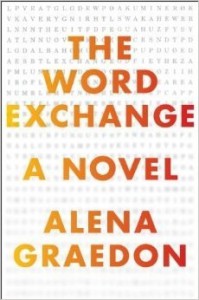

I consider myself somewhat of a Luddite, (yes, I know, as I “blog”) but I am slowly coming to grips with the digital age. I try to resist the lure of things like Facebook, but then get caught up in time-sucks like Pinterest. Lately, I can see how people lose hours of their day watching a Twitter feed, scanning the Booklikes dashboard, or thumbing through the beautifully designed Flipboard app. But when it comes to deep-seated fears and beliefs, I honestly believe that none of these things is necessary, that we could live happy and productive lives without it. In my house growing up, we had a friend we called – regularly – for any trivia we could not remember. Movies, books, random news items; she knew it all. Of course, she was a librarian. The other day, when I was telling my kids about her extraordinary memory, I explained to them that she was replaced by the internet. After reading this book I would go back to that old dial-up version without hesitation.
The Word Exchange is a dystopian novel that takes place only a decade or two in the future. Cell phones have evolved to the extent that they almost read your mind. They hail cabs for you, they anticipate your needs, and yes, they find the words you cannot remember when you need them, for a price. Anana Johnson and her father Doug, have what is probably the least plausible job — they work for the North American Dictionary of the English Language (NADEL). When they call it NADEL, it seems way cooler than it actually is. But of course, in this world, it’s obsolete – their life’s work is compiling one of the rare remaining printed books. Fans of old New York will love the details, especially the pneumatic tube system and the Mercantile building.
This is a book Anne Fadiman might have written, using her father as a reference for the character of Doug Johnson. (If you are a chronic typo spotter, and a hopeless lover of books, look her up if you don’t know who she is; it’s totally worth your time. Start with Ex Libris. Her husband writes too.) What I mean by that digression is that the author, like Ann Fadiman, clearly loves words. The arguments she couches in the mysteries of this book are as compelling as they are disturbing. Liesl Schilinger, writing for the NY Times, called it “A nervy, nerdy dystopic thriller” and that is a near perfect description. There are parts of the story where the action slowed, or where certain parts seemed repetitive, but for the most part, this was a haunting cautionary tale. Read this book when you don’t have too many important things to do the next day. If you’re like me, you’re not going to get much sleep.

 4
4





